It is expected that more internet companies that have exited the historical stage will regain some popularity through Crypto. Companies that are pioneers in a certain field, once or currently well-known, and related to Crypto will be more likely to participate in this game.
Written by: BUBBLE
A week after Trump launched his coin, the on-chain activity remains crazy. Today, another tech mogul has launched a coin. First, the late legend "Crypto Punk" and "Father of Cybersecurity" John McAfee has been cyber-resurrected. His widow, Janice, used McAfee's X account to release $Ainti, claiming to have revived McAfee's legacy using AI. Meanwhile, one of the founders of the short video platform Vine, Rus Yusupov, has launched a memecoin named $Vine, which is likely the first known tech company founder to personally launch a coin after the Trump coin craze. As of the time of writing, its market cap has reached $400 million.
What is Vine
Vine was one of the first platforms to popularize short video content. Its core feature was 6-second looping videos, forcing creators to tell a complete story or convey an idea in a very short time. American users began to get used to consuming quick short video content, and this "short and fast" model laid the foundation for later short video platforms like TikTok, Instagram Reels, and Snapchat.
Vine videos became part of popular culture, with many classic short videos being repeatedly referenced or imitated, even entering mainstream entertainment. Figures like Logan Paul and Jake Paul transitioned from Vine stars to YouTube celebrities. King Bach became famous for creating humorous short videos on Vine and later became a well-known actor and producer. Liza Koshy and Shawn Mendes also evolved from niche Vine personalities to mainstream artists. Although Vine was acquired by Twitter in 2012 and was forced to shut down in 2016, for American users, Vine was not just a short video platform but also a starting point for individual content creation and the rapid dissemination of consumer culture.
How Vine Became a Token Worth $250 Million
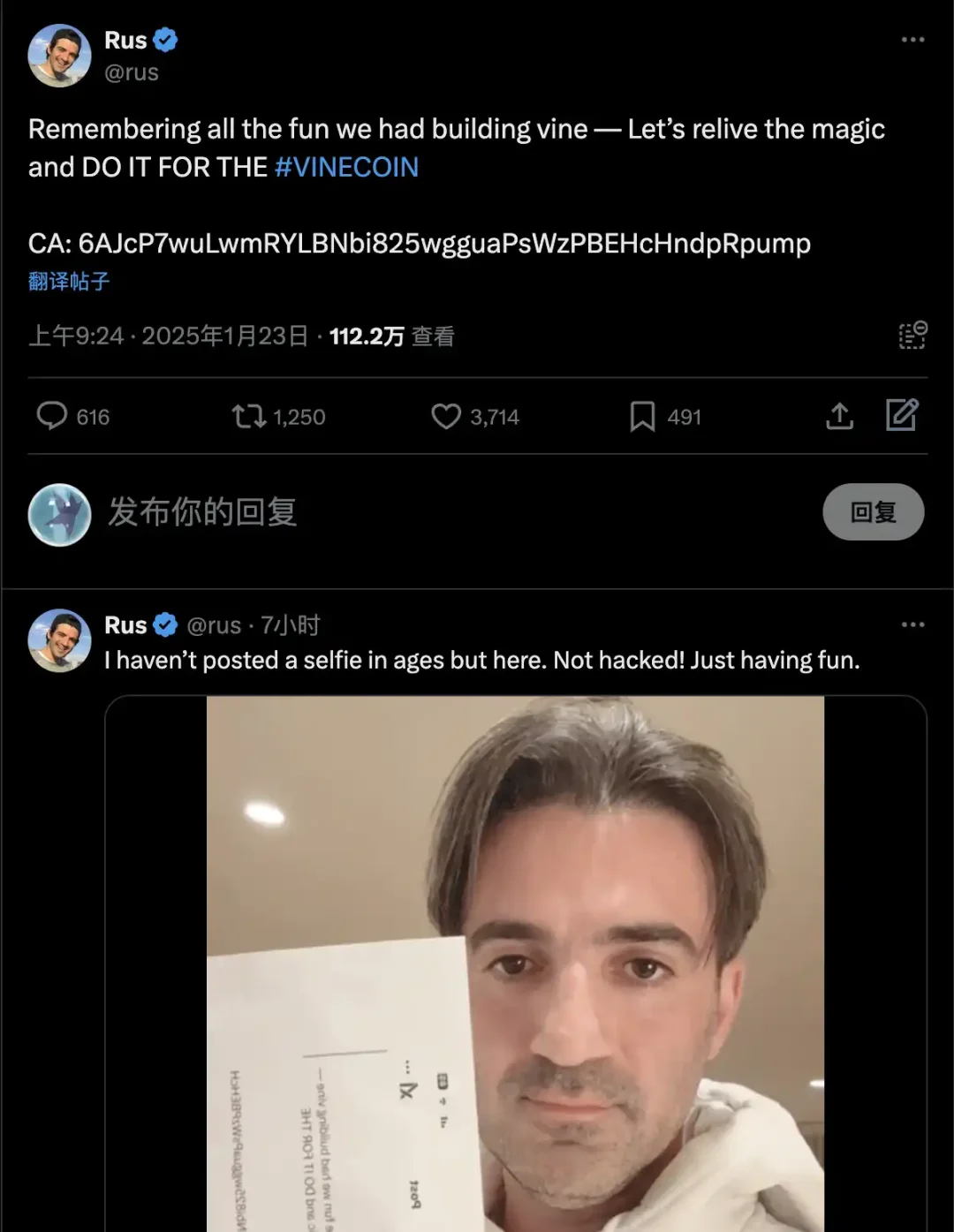
This morning at 8:17, the $Vine token created by Pumpfun initially behaved like previous meme coins until it surged to a market cap of $30 million. The long-silent Vine founder Rus claimed the CA on his X account and posted a GIF holding that tweet as proof. Meanwhile, multiple addresses buying from Coinbase collectively sold off, and the market was flooded with FUD claims that the GIF was AI-generated, as the memecoin $STONKS, which was hacked on Nasdaq, plummeted, causing panic that led to a 90% drop in the price of $Vine, leaving it with a market cap of only $3 million.

An hour later, in a style reminiscent of Vine's short videos, Rus posted a 3-second video proving he was not AI. At the same time, multiple addresses ending with "waamGQ," "MGVWa," and "qedvzf" began buying heavily, occupying the top 30 holders, most of whom still hold. Subsequently, Rus posted a bullish arrow drawing with Vine's logo on a Bullx board. After this on-chain Degen-style tweet, the token price surged to around a $50 million market cap.
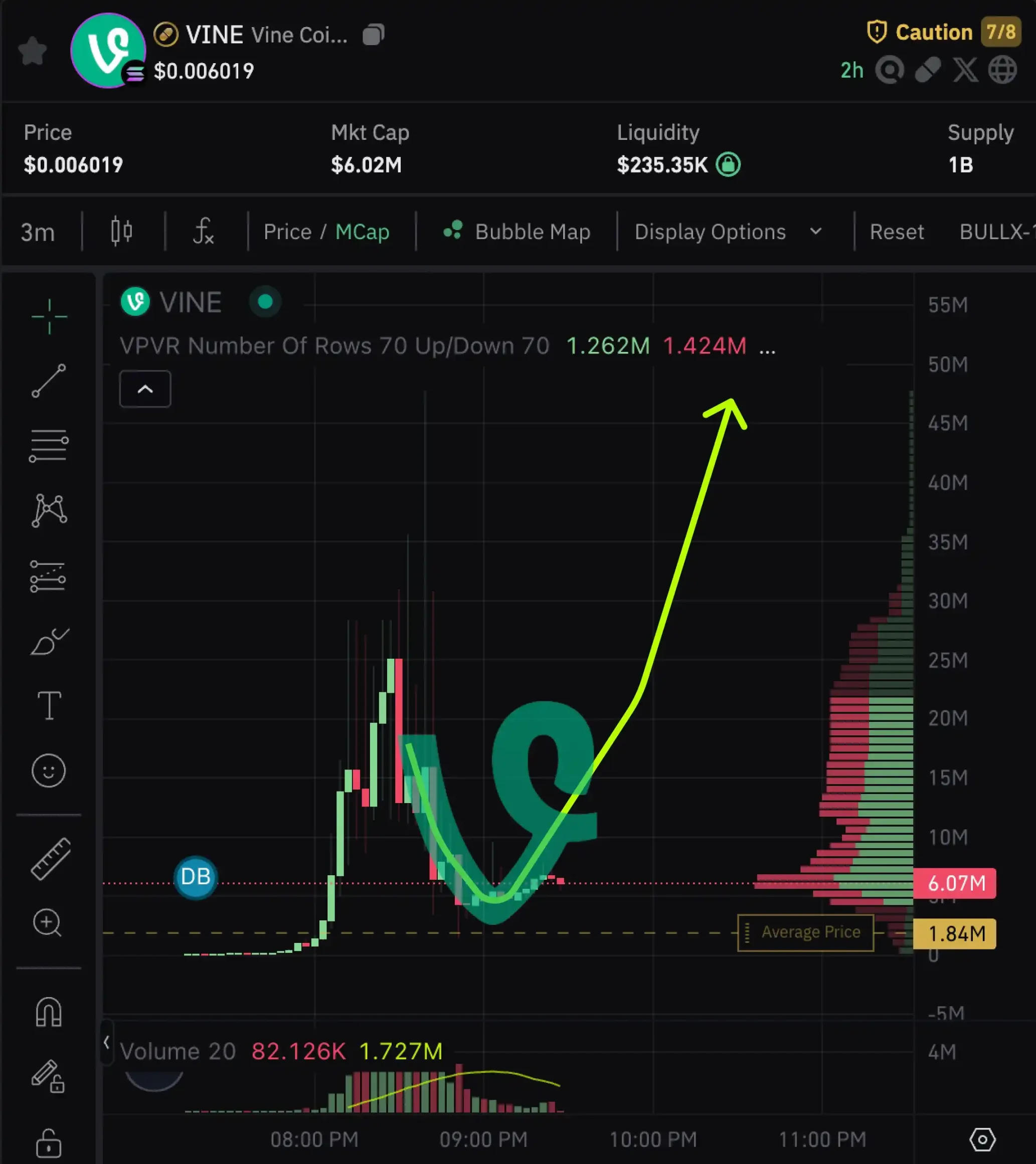
Two hours later, it was announced that the DEV wallet's tokens would be locked until April 20 at 4:20 PM, and several top Alpha Groups in Europe and America commented on $Vine. With a professional team controlling the market and the anticipation of Musk discussing Vine again, along with the positive sentiment of Vine's 12th anniversary, the market cap soared, breaking through $400 million after a period of consolidation at high levels. Despite discussions in the market that Rus was launching a token closely tied to Musk's hype without any announcements benefiting Vine's development, this is the essence of memecoins. When it shifts from a cultural core to an application core, it transforms from a memecoin to a coin, so this article will not discuss the pros and cons involved.
How Relics from Web1.0 and Web2.0 Can Be Revived in Web3.0
Based on the heat generated by Vine, it is certain to trigger a series of internet companies that have exited the historical stage to regain some popularity through Crypto. Whether they genuinely want to be reborn or simply want to leverage attention finance for profit, it presents opportunities for retail investors in the market.
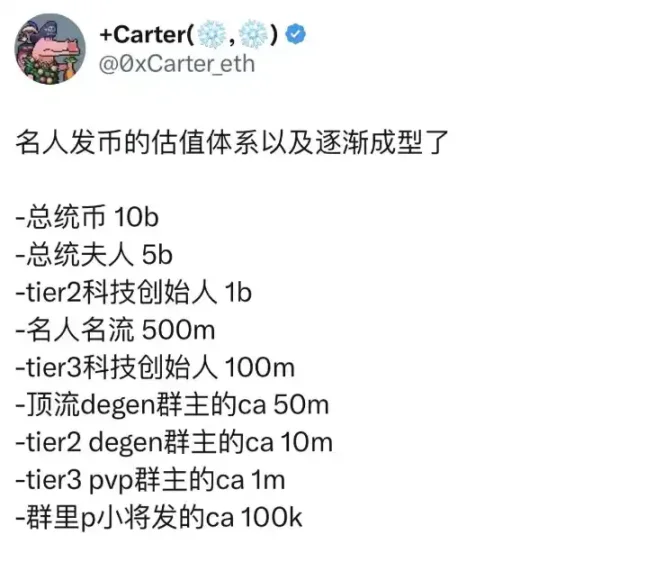
The president or first lady may only have this one opportunity in four years, but tech companies have countless chances. Taking Rus's launch of $Vine as an example, companies that include several of the following elements will be more likely to participate in this game.
The company is a pioneer in a certain field or was once well-known in a certain region, even if it is not currently.
The company should not be currently operating well to avoid greater losses from subsequent legal troubles.
The company is related to Crypto, whether through the founder's interest or investment or subsequent acquisition teams.
I have compiled several projects that meet the above criteria:
Napster
Founded by Shawn Fanning and Sean Parker in 1999, before Napster, the relationship between record companies and artists was close, controlling distribution and promotion, and users could only access new songs through record stores, radio, and television. Napster used peer-to-peer (P2P) technology to allow users to share their MP3 files directly, creating a global music download network. It quickly amassed tens of millions of users. Its decentralized server model made it impossible for record companies to cut off the source, profoundly impacting the traditional record industry. However, due to copyright lawsuits, it was ordered to shut down by the courts in 2001, but it influenced the entire music industry's model and the subsequent thinking about legal digital music rights like iTunes and Spotify.
After multiple acquisitions and transformations, the Napster brand was acquired in 2022 by Hivemind Capital Partners and Algorand, with plans to launch a "Napster Web3 music platform" and had announced plans to issue a Napster Token, but no token has been launched yet.
Napster Twitter: @Napster
Shawn Fanning Twitter: @ShawnFanning
Sean Parker Twitter: @sparker
Hivemind: @HivemindCap
Algorand: @AlgoFoundation

Myspace
Founded by Tom Anderson and Chris DeWolfe, it was later sold to Specific Media, with Justin Timberlake also investing. Before MySpace, internet social interactions were scattered, mostly occurring in forums, instant messaging, and personal blogs. MySpace allowed users to showcase personalized homepages on a large scale, interact with friend networks, and access a vast array of music artists. If Napster was about letting users hear songs, MySpace was about allowing artists to better promote themselves and connect with their fans, laying the groundwork for later social media forms (Facebook, Instagram, Twitter, etc.) in terms of user habits and technological models.
Currently, this project has little to no connection with Crypto, but I believe the founder Tom Anderson's tweet from three years ago, "Buying The Dip," along with the laser-eyed Tom, seems very meme-worthy.
Tom Anderson: @myspacetom
Chris DeWolfe: @Chris_DeWolfe

Mark Cuban
Dallas Mavericks owner and well-known Silicon Valley investor Mark Cuban expressed his willingness to launch a MemeCoin on X, similar to the mechanism of $Trump, with the only difference being that all profits would go to fill the U.S. Treasury. The market is very excited about this approach, as players prefer transparency over the possibility of profits going into individual pockets, as with $Trump. While every businessman's actions are likely to consider risks and returns, the narrative of a meme coin is indeed worth looking forward to.
Mark Cuban: @mcuban
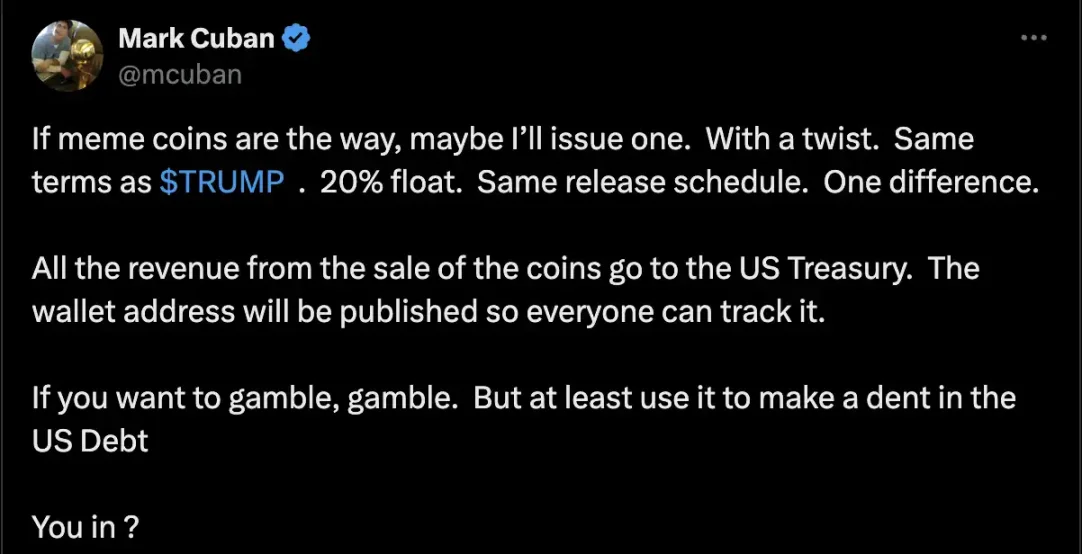
Netscape
Founded by Marc Andreessen and co-founder Jim Clark in 1994, the famous Netscape Navigator browser opened the era of commercial browsers. Currently, there are no Twitter accounts for Jim or Netscape.
LimeWire
Launched in 2000, like Napster, it was a P2P file-sharing software commonly used for downloading music and videos. It was forced to shut down around 2010 due to copyright and infringement disputes. In 2022, Austrian entrepreneurs Paul and Julian Zehetmayr purchased the LimeWire brand and announced a transformation into an NFT trading platform. Although there is already a platform token, the possibility of the founders releasing a Memecoin cannot be ruled out.
Paul Zehetmayr: @pzehetmayr
Julian Zehetmayr: @julianzehetmayr
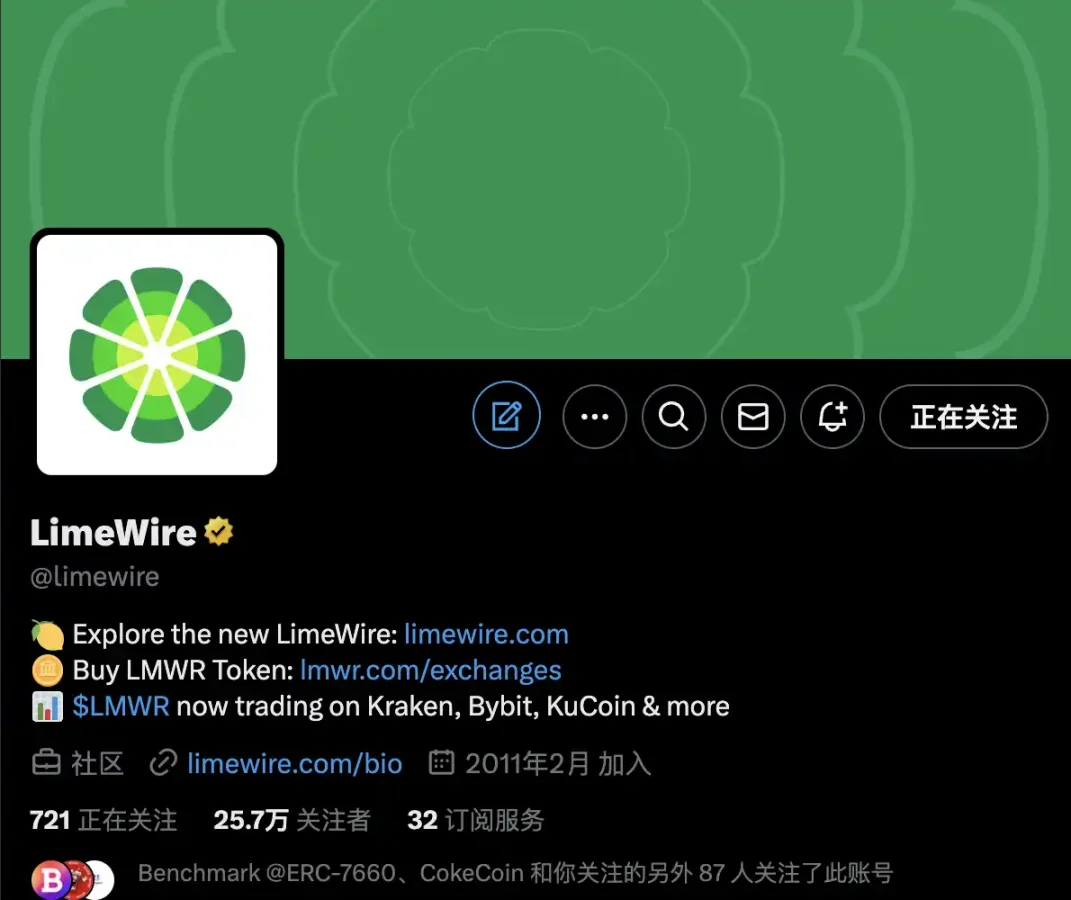
Yahoo!
Founded in 1994 by Jerry Yang and David Filo, Yahoo! had global leadership in various areas such as portal search, email, and instant messaging, and was once the internet traffic giant. During the early stages of the internet in China, Yahoo! was almost universally known. After leaving Yahoo!, Jerry Yang founded AME Cloud Ventures to invest in technology and startup projects, including some in the crypto space.
Jerry Yang, David Filo: No X
AME Cloud Ventures official website: "amecloudventures.com"
AME Managing Director Jeff Chung: @jefchung
In addition to the projects mentioned above, there are many other excellent products from that time that may participate in this movement, whether to bring back memories of the 00s or just to play with a new round of meme coins. The impact caused by the Trump coin is gradually spreading, and as influencers launch coins recklessly, I hope everyone remains calm while following Alpha and stays away from SCAMs.
免责声明:本文章仅代表作者个人观点,不代表本平台的立场和观点。本文章仅供信息分享,不构成对任何人的任何投资建议。用户与作者之间的任何争议,与本平台无关。如网页中刊载的文章或图片涉及侵权,请提供相关的权利证明和身份证明发送邮件到support@aicoin.com,本平台相关工作人员将会进行核查。



